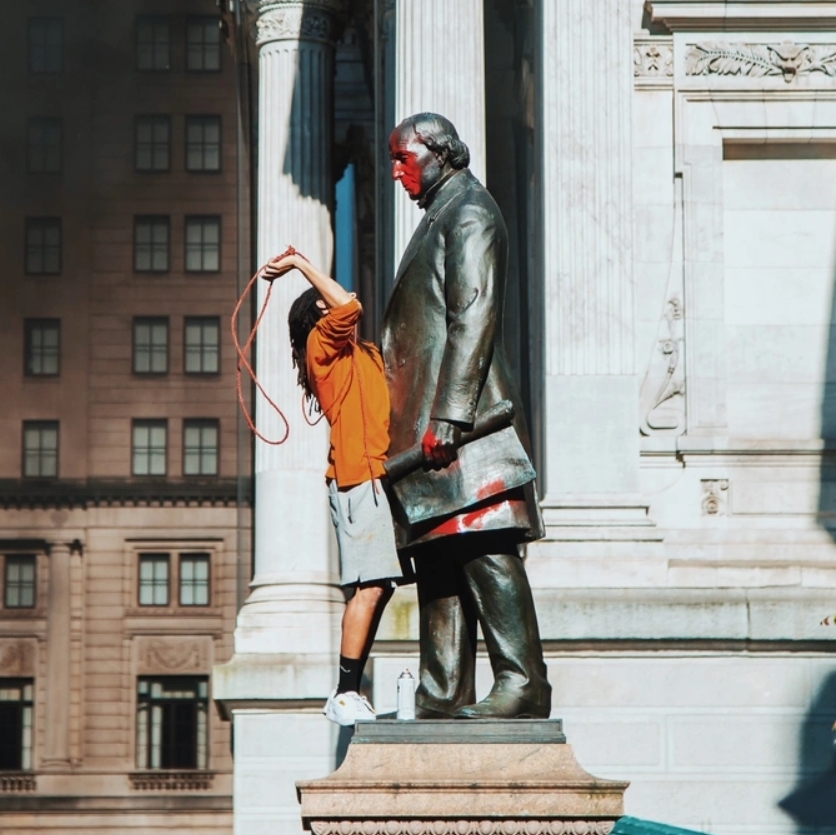Welcome to DU!
The truly grassroots left-of-center political community where regular people, not algorithms, drive the discussions and set the standards.
Join the community:
Create a free account
Support DU (and get rid of ads!):
Become a Star Member
Latest Breaking News
Editorials & Other Articles
General Discussion
The DU Lounge
All Forums
Issue Forums
Culture Forums
Alliance Forums
Region Forums
Support Forums
Help & Search
General Discussion
Related: Editorials & Other Articles, Issue Forums, Alliance Forums, Region ForumsThe American story celebrates violence in the name of democracy That doesn't extend to black protest
The Double Standard of the American RiotThe nationwide protests against police killings have been called un-American by critics, but rebellion has always been used to defend liberty.
https://www.theatlantic.com/culture/archive/2020/06/riots-are-american-way-george-floyd-protests/612466/

Since the beginning of this country, riots and violent rhetoric have been markers of patriotism. When our Founding Fathers fought for independence, violence was the clarion call. Phrases such as “Live free or die,” “Give me liberty or give me death,” and “Rebellion to tyrants is obedience to God” echoed throughout the nation, and continue today. Force and violence have always been used as weapons to defend liberty, because—as John Adams once said in reference to the colonists’ treatment by the British—“We won’t be their Negroes.” Black rebellion and protest, though, have historically never been coupled with allegiance to American democracy. Today, peaceful demonstrations and violent riots alike have erupted across the country in response to police brutality and the killings of George Floyd, Breonna Taylor, and Ahmaud Arbery. Yet the language used to refer to protesters has included looters, thugs, and even claims that they are un-American. The philosophy of force and violence to obtain freedom has long been employed by white people and explicitly denied to black Americans.
Think back to March 5, 1770, when Crispus Attucks, a man of African and Native American descent, became the first casualty of the American Revolution. Attucks was one of a handful of protesters killed by British forces during the Boston Massacre. The lawyer tasked with defending the British soldiers in their American criminal trial was none other than Adams. When presenting his case, Adams described the men those soldiers killed as “a motley rabble of saucy boys, negroes and molattoes [sic], Irish teagues and outlandish jack tarrs.” He built his defense of the British soldiers on the charge that Attucks struck the first blow and led the “dreadful carnage.” Adams concluded that the “mad behavior” of Attucks provoked the soldiers’ response, saying that Attucks’s group was “under the command of a stout molatto fellow, whose very looks, was enough to terrify any person.” Some 250 years later, Adams’s words still underline a central truth in American disobedience: Freedom through violence is a privilege possessed only by whites. Seminal moments in U.S. history that historians have defined as patriotic were also moments that denied patriotism to black people.
If violence is a political language, white Americans are native speakers. But black people are also fluent in the act of resistance. Attucks stood up to British tyranny. The numerous slave rebellions led by Gabriel Prosser, Charles Deslondes, and Nat Turner were all attempts to gain freedom with force. Throughout the 20th century, black Americans armed themselves in the face of white mobs and organized protection for their freedom marches. Accordingly, when George Floyd, Breonna Taylor, and so many others were killed by police, black people and their allies chose to rise up. Americans like to harken back to the civil-rights era as a moment of nonviolence and civil disobedience. But that movement was an orchestrated response to violence. Violence at the voting booth. Violence at the lunch counter. Violence that bombed a church with four little black girls inside. Violence that left a bloated black boy in an open casket. Violence that left a black husband and father murdered in his driveway. The movement ended with the violent death of Martin Luther King Jr. And his death ignited riots in more than 100 cities.
It is easy to dismiss the rock thrower; Attucks himself was accused of throwing sticks. But those who rebuke violent responses to injustice should ask themselves: How should the oppressed respond to their oppressors? How should the nation respond to political dissent? How do the oppressed procure power? Throughout history, black people have employed violence, nonviolence, marches, and boycotts. Only one thing is clear—there is no form of black protest that white supremacy will sanction. Still, black people understand the utility of riotous rebellion: Violence compels a response. Violence disrupts the status quo and the possibility of returning to business as usual. So often the watershed moments of historical record are stamped by violence—it is the engine that propels society along from funerals to fury and from moments to movements.
snip
